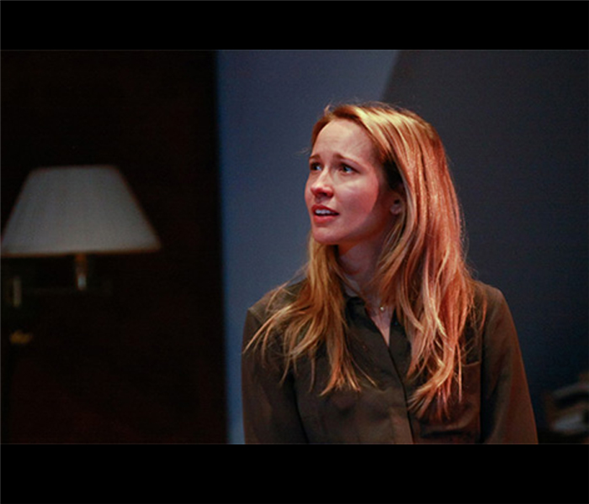Anna Camp plays an artist in crisis in Verité
---
"This play is definitely keeping me up at night," says Anna Camp, the star of
Verité, Nick Jones's unsettling new comedy at Lincoln Center's Claire Tow Theater.
Specifically, she's unsettled by the decisions her character makes about balancing her family life with her career as an aspiring novelist.
"It's about being an artist and the things you give up to be an artist," says the actress. "My mom got married when she was young and had my sister and me. I haven't felt the real urge to have children yet, because I'm still driven to make a career for myself. And you can see how for [my character] Jo, that's not enough for her. She has this desire to become good at what she wants to do with her life, along with being a mother and a wife."
Indeed, though Jo has a husband and young son in suburban New Jersey who have supported her as she's toiled on her first novel, she soon feels it necessary to cut them loose for a while to write her next book. She makes this drastic break after receiving a generous advance from a pair of cheerily nosy New York editors, who reject her first effort but say they love her "voice" and want her to write a memoir -- the more dramatic the better.
{Image1}
At first, Camp says, the publishers' commission "makes Jo feel very uncomfortable. She isn't used to having people interested in her or in what she has to say. And they're interested not in what she's written but in her personal life."
This unwanted attention, though, does make Jo reexamine her mundane existence. An escape hatch seems to appear when she's approached by Winston, a mysterious man who says he knows her from high school. Convinced that "the editors have planted this man in her life to move the story forward," Jo wills herself into a dalliance with him---all for the sake of her art, she tells herself.
This is where Camp's Jo -- up to then an Everywoman protagonist we can trust to take us through the playwright's weird, Charlie Kaufman-esque world -- becomes an unreliable narrator of her own increasingly preposterous life. And it's where Camp's acting starts to get complicated.
"I can't play Jo's desire to actually have an affair, but that's obviously underlying," she says. "I can only play that she's decided to do this for the book, and she wants to prove that she can do it, and that she's not bad at it. So there are two different realities. Winston is in his own reality, and I'm in my own. But I'm also in two realities. It's one of the most complex things I've done."
Camp, despite her all-American ingenue looks, has played multilayered characters before, including
True Blood's evangelical villain-turned-messiah Sarah Newlin. Her last stage role was in 2008's Broadway revival of
Equus, in which she had a lot less stage time than in
Verité but was perhaps equally vulnerable: She shared a long nude scene with Daniel Radcliffe.
Jo's emotional nakedness, though, is clearly what's gotten under Camp's skin, because it's a bit like the sense of personal exposure she's felt as an actor.
"Jo feels, 'If I fail at this, I fail,' and it's her personal life that she'll have failed at, not her writing, so that's a huge failure," Camp explains. "It's similar to the pressure I feel as an actor, choosing this career, wanting to do good work and leave a legacy. All the rejection is that much more painful, because it's
me they're rejecting. It's not like I made some pottery and brought it in. The success is so much more personal, too. But it's a torturous business."
Not least because, even when you do get the job, your character's quandaries have a way of sticking with you after you've left the theatre.
---
Rob Weinert-Kendt is a senior editor at American Theatre and writes regularly about theatre for the New York Times
Photos by Erin Baiano
